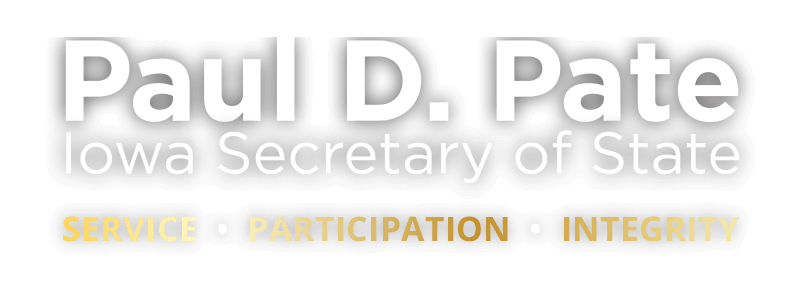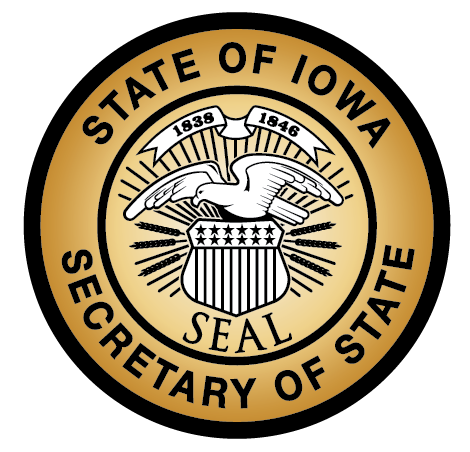Elections 101
Curriculum Overview
Click on each day below for lesson materials, suggested activities, and homework assignments.
To download the entire ten-day curriculum
DOWNLOAD
Day
01
History and Iowa’s First in the Nation Status
Main Objective
Students will be able to explain how Iowa became the first in the nation for the caucuses/primaries. Students will debate/defend why or why not Iowa should maintain its “first in the nation” status.
View Curriculum
Additional Objectives
Students will:
- be able to define a caucus.
- utilize speaking and debate skills.
- analyze news articles as evidence.
- evaluate their own reasons why/why not Iowa should maintain its “first in the nation” status.
Meets Core Standards
Day
02
Political Parties
Main Objective
Students will be able to explain the role of political parties in selecting candidates for office, engaging voters, and organizing their respective caucus.
View Curriculum
Additional Objectives
Students will:
- identify and explain the differences between liberal and conservative ideology.
- evaluate their own political ideology and apply it towards matching their beliefs with a political party and presidential candidate.
Meets Core Standards
Day
03
The Media
Main Objective
Students will be able to explain the role of the media in reporting on elections.
View Curriculum
Additional Objectives
Students will:
- explain how the media’s use of agenda setting and agenda cutting influences the outcome of the elections.
- evaluate the bias presented by some media outlets.
Meets Core Standards
Day
04
Interest Groups
Main Objective
Students will be able to explain the role of interest groups in the electoral process.
View Curriculum
Additional Objectives
Students will:
- be able to research and analyze an interest group to determine its effectiveness.
Meets Core Standards
Day
05
Democrat & Republican / Caucus vs. Primary
Main Objective
Students will be able to describe the similarities and differences between Democrat and Republican caucuses in order to prepare for the mock caucus, and they will be able to articulate the strengths and weaknesses of caucuses and primaries.
View Curriculum
Additional Objectives
Students will:
- be able to review and apply the definition of a caucus.
- continue to hone speaking and debate skills.
- analyze news articles as evidence.
- evaluate which system works the best to nominate a candidate for president: primaries or caucuses?
Meets Core Standards
Day
06
Mock Caucus Simulation
Main Objective
Students will be able to describe how the caucus process works to choose the presidential nominee for both the Republican and Democratic Party.
View Curriculum
Additional Objectives
Students will:
- identify the steps in the caucus process.
- evaluate the effectiveness of the caucus process.
Meets Core Standards
Day
07
The Electoral College
Main Objective
Students will analyze the processes involved and the reasons we use the electoral college system of presidential selection and the strategy required for a successful victory.
View Curriculum
Additional Objectives
Students will:
- be able to define the role of an elector and how electors are chosen.
- understand the Framer’s original plans, reasoning for the plan, and changes that have been made over time.
- debate pros and cons of the electoral college system and various alternative plans proposed for electing the president.
- analyze historical and current election information in various forms as evidence in the creation of their victory campaign strategy.
Meets Core Standards
Day
08
Campaign Finance
Main Objective
Students will develop a basic understanding of how candidates raise funds, what campaign contributions are spent on, the history of campaign finance reform, and the reasons for and against campaign reform.
View Curriculum
Additional Objectives
Students will:
- be able to define campaign finance.
- develop an understanding for campaign donations.
- identify what candidates use their donations for.
- analyze how campaign finance laws have changed over time.
- debate if political contributions give undue influence to donors.
- identify if campaign contribution limits violates free speech.
Meets Core Standards
Day
09
Third Parties & Political Behaviors
Main Objective
Students will define 3rd parties and identify the obstacles and effects of 3rd parties in an election.
View Curriculum
Additional Objectives
Students will:
- evaluate the role of voting behavior in planning a successful campaign for elected office.
Meets Core Standards
Day
10
Campaign Strategy
Main Objective
Students will create a general election campaign strategy synthesizing information from Day 7 (electoral college), Day 8 (campaign finance) and Day 9 (voting behavior) to be presented in class for assessment purposes. This activity assesses all standards previously mentioned in the lesson plans for days 7, 8, & 9.
View Curriculum
Additional Objectives
Students will:
- be able to define the role of an elector and how electors are chosen.
- understand the Framer’s original plans, reasoning for the plan, and changes that have been made over time.
- debate pros and cons of the electoral college system and various alternative plans proposed for electing the president.
- analyze historical and current election information in various forms as evidence in the creation of their victory campaign strategy.
Meets Core Standards


